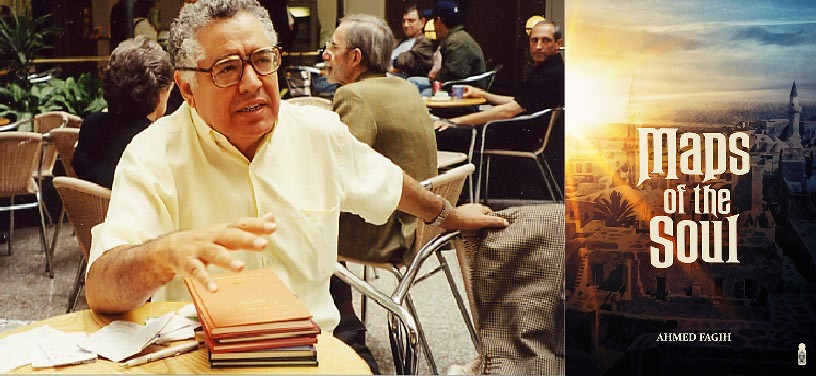It has been a while since I have come across a novel that not only keeps me spellbound but educates me thoroughly. Maps of the Soul, written by Ahmed Fagih and brilliantly translated by Thoraya Allam and Brian Loo, is such a work.
Set during the early 1930s in a Libya ruled by Italian colonialist Italo Balbo, Fagih introduces the reader to the louche neighborhoods of Tripoli alongside the glamorous lives of the prosperous (mostly Italian) elite. Tripoli, its architecture, markets, residents and nightlife are described in such vivid and palpable detail that it lends the novel a cinematic feel. A piece of historical fiction, Maps of the Soul is actually the first three installments of a much larger, twelve-part body of work.
The book opens with the gripping scene of the protagonist Othman al-Sheikh waiting to be executed. To his right, fellow Italian army soldiers are having their heads methodically chopped off by an Abyssinian warrior armed with a knife the length of a sword. As heads roll and blood spurts across the narrator’s face, we are transported back into time to supposedly understand how Othman al-Sheikh comes to end up with neck exposed, primed to be severed. The author’s decision to write in second person endows the novel with a personal sense of urgency that swiftly pulls the reader into the action, and propels the story forward effortlessly, and the translation has skillfully rendered an otherwise difficult form in English.
Othman’s story begins in Awlad Al-Sheikh, a tiny, dusty village in the Libyan Desert. An Islamically educated young man yearning for more, Othman is forced to flee after a sexual indiscretion with a water carrier’s daughter. As a stowaway in the back of a coal truck—literally blackened by his community’s attacks—he arrives in Tripoli with nothing but the clothes on his back. Maps of the Soul traces Othman’s journey from rags to riches and back again, depicting the heavy costs he has to pay along his journey. The title of the novel reflects one of the primary themes into which Fagih delves: our souls, their worth and whether there is a map outlining the paths our souls must tread in this life.
What should you avoid to safeguard your soul? How should people direct themselves towards achieving inner peace? How can we read the yearnings of our own souls and those of others? Can we trust ourselves to do what is right? Othman grapples with these questions while struggling to protect his soul from depravity.
Othman begins his journey in the capital by scrounging for food scraps on the streets. He becomes a cobbler’s apprentice, only to be kidnapped for conscription into the Italian Army (which was preparing to invade Abyssinia). After a narrow escape, desperation drives Othman to join the army once again, this time voluntarily, in order to elevate his status in society. As economic and political advancement come to him, Othman wonders how much of his actions he can attribute to survival before he loses his soul. He willfully whips his fellow comrades to gain the esteem of his superiors and starts learning Italian to converse with those higher-ranked. He joins the detested Fascist party. All this, he assures himself, is in order to avoid having to go to war in the unknown jungles of Abyssinia.
A good number Othman’s colleagues envy him for his extra responsibilities around the military base, his freedom to leave the base to attend to the needs of the Governor General’s Libyan mistress, his most unusual achievement of gaining a driving license and his eventual government post. But aside from his native language, religion, and appearance, Othman begins to ponder on what, if anything, distinguishes him from the Italians, culpable for harassing, stealing from, and killing his compatriots.
Othman’s identity struggle is mirrored in his relationships with women: the traditional, innocent Thuraya; Houriya, the enchanting yet profligate mistress of the colonialist Balbo himself; and Nurya, the voluptuous prostitute. With Thuraya, Othman sees himself as the village boy who memorized the Quran, respecting the traditional norms of society and expecting the same of Thuraya.
Even at over seven hundred pages, Maps of the Soul is a quick read that would leave the reader with a much deeper appreciation of Libya and Italy’s shared history. Perhaps even more important is how it explores the dilemma of how would you act if struggling to survive whilst serving a colonial master. Fagih’s stylistic choices make it easy for readers to treat Othman’s story as their own, leaving them wondering, as they breeze through the pages, to what lengths they would go to survive under foreign rule, and how much of their identity they would be willing to efface to sustain life in such complex circumstances.
*****
Sawad Hussain is an Arabic teacher, translator and litterateur who holds an MA in Modern Arabic Literature from the School of Oriental and African Studies. She is passionate about all things related to Arab culture, history and literature. Her dream job would be to translate and review Arabic literature full time.

